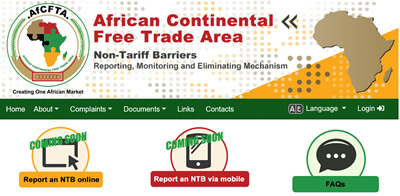An innovative online tool by UNCTAD and the African Union is set to help African countries navigate non-tariff barriers as the continent opens its free trade area.
The ink on the African Continental Free Trade Area (AfCFTA) agreement is dry and the players are ready to trade, but a large and complicated hurdle remains - non-tariff barriers (NTBs).
NTBs are a wide range of restrictive regulations and procedures, other than tariffs, that make trade difficult and/or costly.
They are one of the main roadblocks to trade on the African continent – much more than tariffs and include customs clearance delays, restrictive licensing processes, certification challenges and rules of origin.
“The time and costs of moving goods in Africa will be reduced if there is political willingness to fight non-tariff barriers,” UNCTAD Secretary-General Mukhisa Kituyi said.
UNCTAD and the African Union are taking on these barriers through an online tool that aims to facilitate quicker and more efficient trade.
Niger’s president, Issoufou Mahamadou, and Dr. Kituyi presented the new tradebarriers.africa platform to the African Union at the 12th African Union Extraordinary Summit in Niamey, Niger on 7 July.
“Looking at the map of Africa, one has a sad feeling of facing a broken mirror. Our generation has the historic responsibility of breaking these borders,” Mr. Mahamadou said. “The AfCFTA will benefit all Africans.”
The AfCFTA non-tariff barriers online mechanism is designed to improve intra-African trade by offering a site for reporting and resolving non-tariff barriers experienced by businesses, particularly small ones, and those owned by women and youth.
Lowering and managing non-tariff barriers better will also help maximize the anticipated benefits of the free trade area.
Dissolving borders, breaking barriers
A recent UNCTAD report shows that African countries could gain US$20 billion each year by tackling the trade-distorting effects of non-tariff measures at the continental level – way more than they could pick up by eliminating tariffs.
This gain, and a need to curb the costs of NTBs, are part of the reason why UNCTAD and the African Union worked together to develop the new mechanism.
It’s a boon for the AfCFTA because traders and companies can use it to:
- report barriers to their day-to-day operations on the website
- submit complaints using an offline short-messaging-service feature
- receive up-to-date information on NTB resolution processes
Buy-in and ownership by the AfCFTA member states is the main reason this mechanism will work, UNCTAD economist Christian Knebel said.
“Over several negotiating rounds, the online tool was reviewed and approved by technical experts, chief negotiators, senior trade officials, ministers of trade and finally launched by heads of state,” he said.
“There was a strong commitment to implementing the mechanism and achieving inclusiveness for small traders.”
The tool will be managed by the African Union through the AfCFTA Secretariat, to be based in Ghana.
An NTB coordination unit in the secretariat will manage the system and facilitate the resolution of reported barriers between countries.
Governments have committed to appointing national focal points to help resolve NTBs.
These officials are mandated to receive NTB complaints in real-time and resolve them within given deadlines to enhance and facilitate intra-Africa trade.
“This tool will also impact ordinary lives, opening up earning opportunities for the informal sector and small and medium enterprises, which will help to create jobs and, importantly, alleviate poverty,” Dr. Kituyi said.
Many expect the tool to help African traders capitalize on their new free trade area, a fast-growing $2 trillion market of 1.2 billion people.

